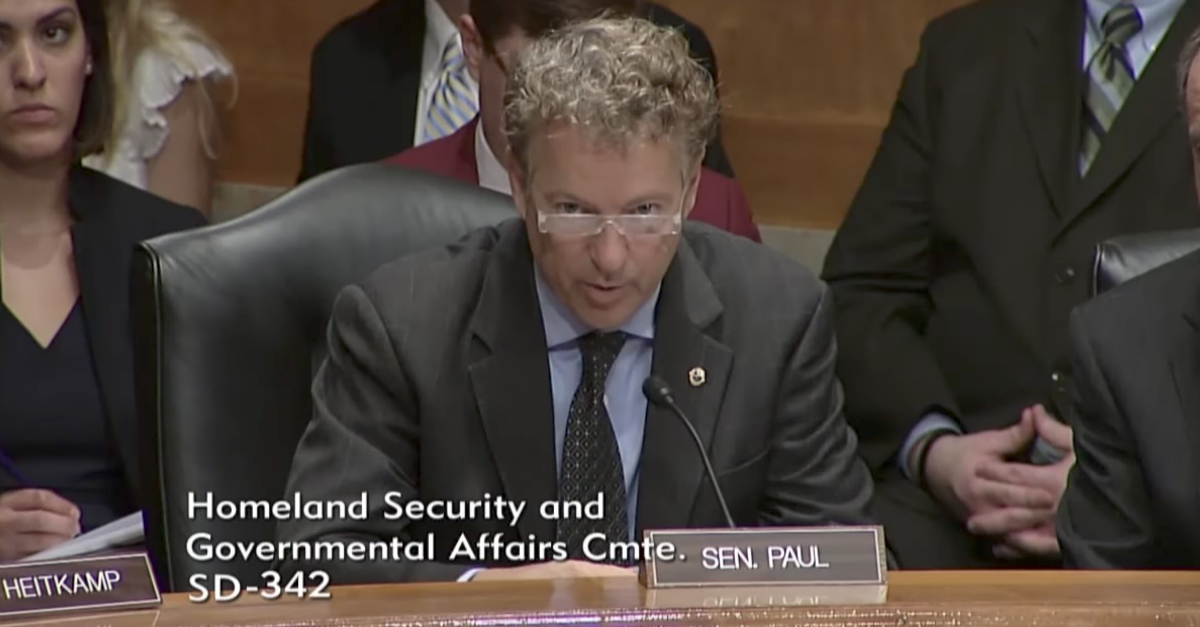Sen. Rand Paul took Department of Homeland Security Chief John Kelly to task during a senate panel on Tuesday over his agency’s practice of seizing citizens phones when trying to re-enter the U.S.
Videos by Rare
“The last time you were here we talked about citizens coming across the border and being threatened with non-entry or detention if they did not divulge the contents of their phone,” Paul said to Kelly.
“And your response was, ‘I just don’t believe we’re doing it.”
RELATED: Rand Paul: We should repeal Obamacare like Republicans promised, not just “fix” it
Paul continued, “So we asked some questions in writing and we’re still waiting on the response, and it’s been about six weeks or so. But I thought I would list for you a couple of the public episodes of this happening.”
Sen. Paul listed specific cases of this occurring:
This year a NASA engineer, and a U.S. citizen, was pulled aside after coming back from Chile. They demanded the pin for his phone and they handed him a form that explained how CBP (Customs and Border Protection) had the right to copy the contents of his phone—all the contents of his phone.
Two citizens were returning from Canada. NBC did an investigation of 25 different cases of U.S. citizens being told to turn over their phones, unlock them or provide passwords.
A U.S. citizen was taken off of a flight in L.A. handcuffed and released after a Homeland Security agent looked through his phone for 15 minutes.
A U.S. citizen journalist also had their phone taken.
Paul concluded his examples with, “So I guess my question is, is your answer still ‘I just don’t believe we’re doing it?’”
“We don’t do it routinely unless there is a reason why, so that’s a change,” responded Kelly. “We do it whether they are citizens or non-citizens coming in.”
“Of the million or so people that come into the country, half of one percent is checked, and always according to the law,” Kelly said. “Now, typically, the officers who are engaged in the frontline defense at the ports of entry, in their questioning of individuals for whatever has tipped them off will cause them to have certain conversations […] but again senator, very seldom done and always for a reason and always within the law,” Kelly added.
“You’re just fine with the policy that arbitrarily takes someone’s phone and says you can’t come back into the country?” Paul asked.
“Not arbitrarily; there’s a reason why they do it, senator,” Kelly responded.
“Well, no, the thing is, it is arbitrary, unless there are rules as to how you do it,” Paul replied. “What are the rules? In our country, if you want to look at my phone, you call a judge, in my country. You know, so, this wouldn’t necessarily be American jurisprudence if you’re just saying we might have some internal rules. Have you published what your rules are?”
“Whether they’re published or not, or specific enough to publish, I don’t know but I can certainly get back to you,” Kelly said.
Paul voiced his dissatisfaction, “I can tell you I’m not happy with the policy and I wish it were different, and we have actually introduced legislation to try to stop you from doing this, and to make you go to a court, the way we do it in our country typically.”
“We go to a court and you ask a judge, and you have to present evidence,” Paul said.
RELATED: Rand Paul and Ron Wyden introduce a bill that would stop warrantless phone searches at the border
The senator seemed to imply that these phone searches have become so commonplace that some have been advising U.S. travelers to leave their phones at home with traveling outside the country.
“People are now talking,” Paul said. “There are people giving you advice to not take your phone abroad because when you come back home your country won’t let you come home unless you let them look at your entire life.”
“I think there’s a point of which we give up so much of our liberty to travel, that—has it been worth it?” Paul asked.
“We can live in a secure state if we clampdown and we have no freedom to travel, and we give up all of our privacy to travel,” Paul added. “I just don’t think that’s necessary.”
Paul and Sen. Ron Wyden (D-Or.) introduced the Protecting Data at the Border Act in April, which would make it illegal for border or law enforcement officials to search or seize U.S. citizens data via their phones or other devices without probable cause.
Disclosure: I co-authored the 2011 book The Tea Party Goes to Washington with Sen. Rand Paul.



